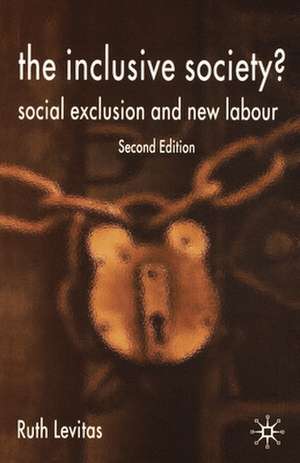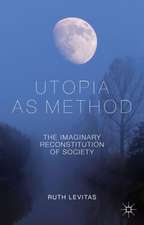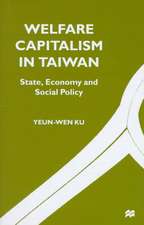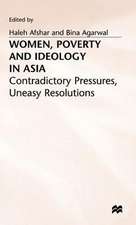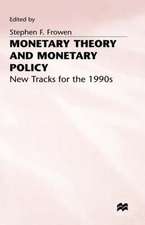The Inclusive Society?: Social Exclusion and New Labour
Autor Ruth Levitasen Limba Engleză Paperback – 5 apr 2005
Preț: 497.31 lei
Preț vechi: 585.07 lei
-15% Nou
Puncte Express: 746
Preț estimativ în valută:
95.16€ • 99.61$ • 79.20£
95.16€ • 99.61$ • 79.20£
Carte tipărită la comandă
Livrare economică 01-15 aprilie
Preluare comenzi: 021 569.72.76
Specificații
ISBN-13: 9781403944276
ISBN-10: 140394427X
Pagini: 296
Ilustrații: XV, 277 p. 1 illus.
Dimensiuni: 140 x 216 x 20 mm
Greutate: 0.36 kg
Ediția:2005
Editura: Palgrave Macmillan UK
Colecția Palgrave Macmillan
Locul publicării:London, United Kingdom
ISBN-10: 140394427X
Pagini: 296
Ilustrații: XV, 277 p. 1 illus.
Dimensiuni: 140 x 216 x 20 mm
Greutate: 0.36 kg
Ediția:2005
Editura: Palgrave Macmillan UK
Colecția Palgrave Macmillan
Locul publicării:London, United Kingdom
Cuprins
Acknowledgements Introduction Discourses of Social Exclusion From Social Justice to Social Cohesion The Optimism of Will Staking Claims Community Rules New Labour, New Discourse From Equality to Social Inclusion Delivering Social Inclusion The New Durkheimian Hegemony Postscript: From Margins to Mainstream Notes Select Bibliography Index
Recenzii
Praise for the First edition:
'This is a stunningly effective critique of some of New Labour's flannel. Ruth Levitas has provided a cool, analytical dissection of the subtle changes in approach towards poverty and social exclusion appearing in various influential documents of the 1990s...this book should make both politicians and sociologists squirm.' - Ray Pahl, The Sociological Review
'...this is a really good book - clear coherent, and plainly and intelligibly written.' - David Byrne, Work, Employment and Society
'This incisive and very readable account of the New Labour discourse and politics of social exclusion is both topical and thought-provoking. It reminds us that the cosy language of community, stakeholding and social inclusion can serve to obscure inequalities and fundamental conflicts of interest. It should be read not just by all those interested in the New Labour 'project' but, even more importantly, by those conducting it.' - Ruth Lister, Professor of Social Policy, Department of Social Sciences, Loughborough University
Endorsments for this edition:
'This is a provocative work that deserves to be read by a wide audience, including undergraduate and postgraduate students of politics, sociology and social policy, together with those seeking a sophisticated analysis of the New Labour project.' - Paul Higate, University of York
'This is a stunningly effective critique of some of New Labour's flannel. Ruth Levitas has provided a cool, analytical dissection of the subtle changes in approach towards poverty and social exclusion appearing in various influential documents of the 1990s...this book should make both politicians and sociologists squirm.' - Ray Pahl, The Sociological Review
'...this is a really good book - clear coherent, and plainly and intelligibly written.' - David Byrne, Work, Employment and Society
'This incisive and very readable account of the New Labour discourse and politics of social exclusion is both topical and thought-provoking. It reminds us that the cosy language of community, stakeholding and social inclusion can serve to obscure inequalities and fundamental conflicts of interest. It should be read not just by all those interested in the New Labour 'project' but, even more importantly, by those conducting it.' - Ruth Lister, Professor of Social Policy, Department of Social Sciences, Loughborough University
Endorsments for this edition:
'This is a provocative work that deserves to be read by a wide audience, including undergraduate and postgraduate students of politics, sociology and social policy, together with those seeking a sophisticated analysis of the New Labour project.' - Paul Higate, University of York
Notă biografică
Ruth Levitas is Professor of Sociology at the University of Bristol, founding Chair of the Utopian Studies Society Europe, and Chair of the William Morris Society. Her publications include The Concept of Utopia . In 2012 she received the Lyman Tower Sargent Award for Distinguished Scholarship in Utopian Studies.
